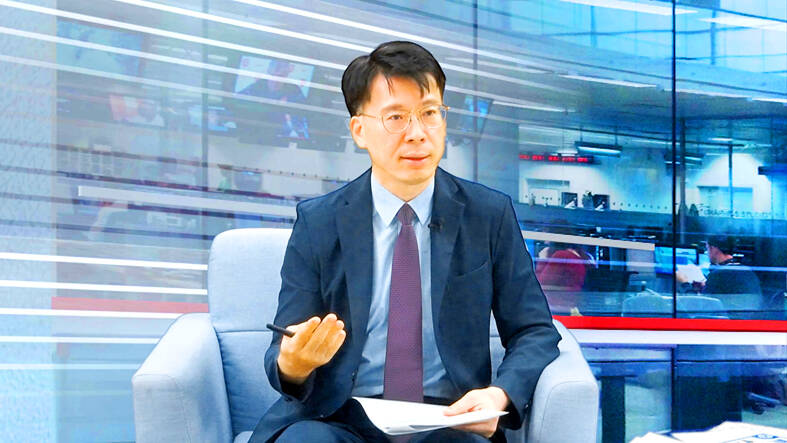China disposes seven times as much nuclear waste as Japan plans to release, but no pollution has been detected in waters near Kinmen County, Atomic Energy Council Secretary-General Wang Chung-der (王重德) said in an interview yesterday, ahead of Japan’s planned release of nuclear wastewater starting this month.
He made the remarks in a video interview with the Chinese-language Liberty Times (the Taipei Times’ sister newspaper) published on its Web site.
China operates a large number of nuclear power plants along its southeastern seaboard that utilize pressurized water reactors, which discharge wastewater with a higher concentration of tritium than boiling water reactors used by the tsunami-crippled Fukushima Dai-ichi nuclear power plant in Japan, he said.

Photo: Huang Chun-hsuan, Taipei Times
Chinese nuclear power plants discharged seven to eight times more tritium-infused water than the Japanese plan for Fukushima Dai-ichi would release in a year, he said.
China’s Qingshan III nuclear power plant in Zhejiang Province discharges 143 trillion becquerels (Bq) yearly, while the Yangjiang and Ningde plants in China’s Guangdong and Fujian provinces discharge 122 trillion Bq and 111 trillion Bq respectively, and the Hongyanhe plant in Liaoning Province discharges 107 trillion Bq, he said, citing official Chinese data.
The total tritium output from these four plants — which lead China in the quantity of the substance released — is the equivalent of five times the planned annual discharge from the Fukushima Dai-ichi plant, he said.
The council regularly monitors the sea at various locations for radioactive materials, and nine of these locations are situated in the waters off Kinmen, Lienchiang and Penghu counties, Wang said.
It is capable of measuring radioactivity in the wastewater from China’s nuclear power plants, he said, adding that these nine stations have detected no radiological activity beyond background radiation.
The Japanese plan to dispose of the wastewater from Fukushima Dai-ichi involves processing the water to remove all radioactive elements except tritium and it has been approved by the International Atomic Energy Agency (IAEA), he said.
Tritium is a radioactive isotope of hydrogen and the radiation it emits does not penetrate skin, Wang said, adding that the substance is believed to be carcinogenic only if ingested in extremely large amounts.
Medical literature does not indicate that ingesting trace amounts of tritium can cause negative health effects, Wang said.
Although Taiwan is not an IAEA member, the nation signed a memorandum of understanding with Japan to share relevant information about nuclear energy and receive updates on Tokyo’s plans to release wastewater as quickly as agency member states do, he said.
Delegations of Taiwanese experts have visited Japan three times to inspect the water processing technology to ensure that radioactivity from more than 60 types of radionuclides were removed from water as Japan claimed, he said.
When Japan moves forward with the discharge plan this month, a Taiwanese team would monitor the situation and keep lines of communication open at the source, Wang said.
The council is in the process of implementing measures to protect public safety, including increasing the number of seawater sampling locations from 33 to 107 and establishing a lab to measure tritium levels in seafood, he said.

An essay competition jointly organized by a local writing society and a publisher affiliated with the Chinese Communist Party (CCP) might have contravened the Act Governing Relations Between the People of the Taiwan Area and the Mainland Area (臺灣地區與大陸地區人民關係條例), the Mainland Affairs Council (MAC) said on Thursday. “In this case, the partner organization is clearly an agency under the CCP’s Fujian Provincial Committee,” MAC Deputy Minister and spokesperson Liang Wen-chieh (梁文傑) said at a news briefing in Taipei. “It also involves bringing Taiwanese students to China with all-expenses-paid arrangements to attend award ceremonies and camps,” Liang said. Those two “characteristics” are typically sufficient

A magnitude 5.9 earthquake that struck about 33km off the coast of Hualien City was the "main shock" in a series of quakes in the area, with aftershocks expected over the next three days, the Central Weather Administration (CWA) said yesterday. Prior to the magnitude 5.9 quake shaking most of Taiwan at 6:53pm yesterday, six other earthquakes stronger than a magnitude of 4, starting with a magnitude 5.5 quake at 6:09pm, occurred in the area. CWA Seismological Center Director Wu Chien-fu (吳健富) confirmed that the quakes were all part of the same series and that the magnitude 5.5 temblor was

The brilliant blue waters, thick foliage and bucolic atmosphere on this seemingly idyllic archipelago deep in the Pacific Ocean belie the key role it now plays in a titanic geopolitical struggle. Palau is again on the front line as China, and the US and its allies prepare their forces in an intensifying contest for control over the Asia-Pacific region. The democratic nation of just 17,000 people hosts US-controlled airstrips and soon-to-be-completed radar installations that the US military describes as “critical” to monitoring vast swathes of water and airspace. It is also a key piece of the second island chain, a string of

The Central Weather Administration has issued a heat alert for southeastern Taiwan, warning of temperatures as high as 36°C today, while alerting some coastal areas of strong winds later in the day. Kaohsiung’s Neimen District (內門) and Pingtung County’s Neipu Township (內埔) are under an orange heat alert, which warns of temperatures as high as 36°C for three consecutive days, the CWA said, citing southwest winds. The heat would also extend to Tainan’s Nansi (楠西) and Yujing (玉井) districts, as well as Pingtung’s Gaoshu (高樹), Yanpu (鹽埔) and Majia (瑪家) townships, it said, forecasting highs of up to 36°C in those areas